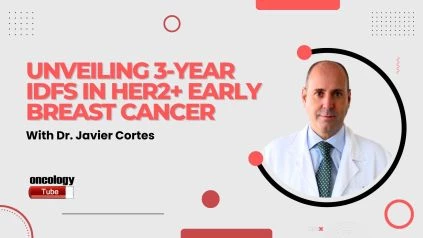Dr. Javier Cortes discussed the PHERGain clinical study is a phase 2 trial focused on the potential deescalation of chemotherapy in the treatment of HER2-positive breast cancer. The trial utilizes a novel design that adapts the treatment approach based on early metabolic response and subsequent pathological response. This strategy aims to minimize the use of chemotherapy while maintaining effective outcomes.
Trastuzumab, a targeted therapy, is known to bind to the HER2 protein. Pertuzumab, another targeted therapy, has shown promise in patients with HER2-positive breast cancer. It has been approved for use in metastatic and early-stage HER2-positive breast cancer. When combined with Trastuzumab in the neoadjuvant setting, Pertuzumab has demonstrated improved pathological complete remission rates and long-term outcomes. Pertuzumab is considered a standard component of treatment for patients undergoing neoadjuvant therapy.
In the case of stage 1 HER2-positive breast cancer, chemotherapy is still recommended. Studies such as the APT study have shown positive long-term outcomes when combining Paclitaxel chemotherapy with one year of Trastuzumab in patients with small tumors (less than 3 centimeters) and no lymph node involvement.
Trastuzumab is widely used in the treatment of HER2-positive breast cancer across different stages. It is commonly used in the adjuvant, neoadjuvant, and metastatic settings. Additionally, there are ongoing studies exploring the use of Trastuzumab in combination with other therapies, such as antibody-drug conjugates.
HER2-positive breast cancer is considered more aggressive due to the overexpression of the HER2 protein. When left untreated or poorly treated, HER2-positive tumors have a higher likelihood of metastasizing. Common sites of metastasis include the liver, lungs, and brain.
Trastuzumab can be administered either subcutaneously or through intravenous infusions. Both methods have shown similar efficacy, but subcutaneous administration offers the advantage of shorter hospital stays and eliminates the need for intravenous devices.
Mastectomy is not solely determined by the HER2-positive subtype. The decision to perform mastectomy or breast-conserving surgery depends on factors such as response to chemotherapy, tumor size, and the presence of additional factors such as ductal carcinoma in situ.
Early-stage HER2-positive breast cancer is considered curable, especially when diagnosed early. The majority of early-stage HER2-positive tumors have a high chance of being cured. However, determining which patients with metastatic disease can be cured remains a challenge.

